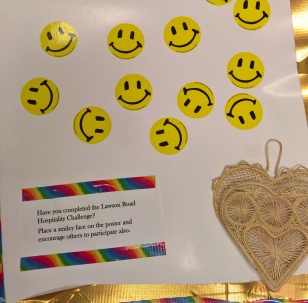The Islamic month of Ramadan this year ran from June 6 to July 5. During that month a local Turkish Cultural Center hosted a series of community meals. They offered a variety of formats.
First, they invited community members to come to their facility and enjoy a meal with a large group of people. Second, they offered to prepare the meal but host it in our church’s fellowship space. Third, if people were interested they would schedule community members to come into their homes and share an iftar meal with them.
 As I talked with them they explained their simple reasoning. Sharing a meal together breaks down barriers. It encourages conversations as people share the experience of meeting a fundamental human need, eating. They longed for their neighbors to see past their religion, or different clothing to recognise and acknowledge our shared humanity. In discussing the experience we talk about the food and their favorite Turkish dishes. They share what they value about Ramadan and we exchange notes on the Muslim and Christian practices of fasting.
As I talked with them they explained their simple reasoning. Sharing a meal together breaks down barriers. It encourages conversations as people share the experience of meeting a fundamental human need, eating. They longed for their neighbors to see past their religion, or different clothing to recognise and acknowledge our shared humanity. In discussing the experience we talk about the food and their favorite Turkish dishes. They share what they value about Ramadan and we exchange notes on the Muslim and Christian practices of fasting.
By sharing a meal we discuss topics we would never broach talking to each other across a desk or in a classroom.
Jesus knew the power of meals. In the Gospels we find him frequently eating with a variety of different people. Often, Jesus ate with those who were furthest from the Kingdom of God. Jesus’ dining habits were apparently a frequent source of conversation to the extent that Luke describes the criticism Jesus recieved,
The Son of Man came eating and drinking, and you say, ‘Here is a glutton and a drunkard, a friend of tax collectors and sinners.’ (Luke 7:34)
A couple of weeks ago my church declared October our “Month of Hospitality”. My sermon that week was based on Ephesians 2:11-22. I suggested that if Jesus died to reconcile Jews and Gentiles to each other, and if “you too are being built together to become a dwelling in which God lives by his Spirit.” (Eph 2:22) then we need to actually be doing something.
 We gave the church the simple task of using a meal to break down a wall by eating with someone on the other side of a divide. We provided a few guidelines:
We gave the church the simple task of using a meal to break down a wall by eating with someone on the other side of a divide. We provided a few guidelines:
- You should invite someone from our church that you don’t know well to share a meal or a coffee.
- The person should be on the other side of a divide: race, nationality, age, marital status, education, income, etc.
- Given the context of our church, this is a great opportunity to intentionally break racial barriers and specifically ask each other how you perceive the racial climate in this country at the moment.
The natural next step is to expand the hospitality to bridge divisions with those outside the church. Each of those steps takes more confidence and requires a greater investment, but the results make it worthwhile. Even in a multi-ethnic church people often need encouragement to break out of their comfort zones, spend some time building relationships and destroy some dividing walls.
We make this as simple as possible. Although we use the word “hospitality” we don’t pressure people to invite others into their home, or to cook a 3 course meal. The goal is to sit, eat, and drink together. If that happens at a Wendy’s or a Starbucks, or if the bill is split rather than one person treating another, it doesn’t matter as long as each person knows the other a little better at the end of their time together.
When we first did this in 2014 we posted the above board in our foyer and encouraged people to record their participation. It’s gone very well and I’d love for you to try it in your church setting and hear how you improve it.